“Mr. Baseball” — A Movie of Japanese Culture and Business Practices
–> Buy Mr. Baseball from Amazon.com!
*SPOILER REVIEW!!!*
 Back when I lived in Japan, filming began on Mr. Baseball so forgive me if I get a bit nostalgic here because this is Japan as I remember it.
Back when I lived in Japan, filming began on Mr. Baseball so forgive me if I get a bit nostalgic here because this is Japan as I remember it.
That said, every time there’s a controversy over some decision a Japanese anime/manga company makes (such as the Fractale thingy that happened a while back), I think of Mr. Baseball as it provides not only a good look at Japanese culture (and life in Japan in the early 1990’s), but also gives a glimpse into Japanese business practices. As such, I want to cover those elements of the movie as well as the cultural aspects because despite its title, Mr. Baseball isn’t just about baseball, but it is everything about Japan.
Summary/Synopsis:
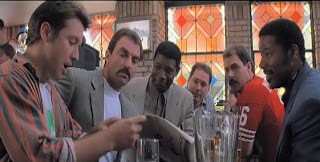 The story, in brief, has aging Major League first baseman Jack Elliot (Tom Selleck) partying hard and sleeping with coeds, but not doing so well on the baseball field. As such, the Yankees send him to the Chunichi Dragons in Nagoya, Japan. Jack doesn’t take things too seriously, so his assigned translator Yoji (SHIOYA Toshi) takes it upon himself to modify Jacks words to the press to express respect and the like. His first day with the Dragons, he meets fellow American Max “Hammer” Dubois (Dennis Haysbert), who’s been playing for the team for five years and is now proficient in Japanese. He also meets Hiroko (TAKANASHI Aya), who invites him to dinner. After Jack meets up with some fellow Americans at a gaijin bar in town, Jack learns of what Yoji has done and sets him straight. He then meets with Hiroko, but is offended when he learns he’s required to do endorsements as part of his contract.
The story, in brief, has aging Major League first baseman Jack Elliot (Tom Selleck) partying hard and sleeping with coeds, but not doing so well on the baseball field. As such, the Yankees send him to the Chunichi Dragons in Nagoya, Japan. Jack doesn’t take things too seriously, so his assigned translator Yoji (SHIOYA Toshi) takes it upon himself to modify Jacks words to the press to express respect and the like. His first day with the Dragons, he meets fellow American Max “Hammer” Dubois (Dennis Haysbert), who’s been playing for the team for five years and is now proficient in Japanese. He also meets Hiroko (TAKANASHI Aya), who invites him to dinner. After Jack meets up with some fellow Americans at a gaijin bar in town, Jack learns of what Yoji has done and sets him straight. He then meets with Hiroko, but is offended when he learns he’s required to do endorsements as part of his contract.
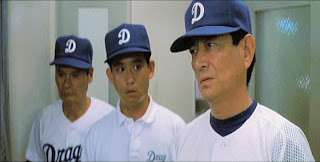 Jack chafes at the Japanese ways of doing things and their criticism that he has a hole in his swing when he’s having great games. However, Japanese opponents soon learn his weakness and Jack’s antics bring down the wrath of the corporate sponsors on the team’s manager, Uchiyama-san (TAKAKURA Ken). Jack is fined and then suspended and seeks help from Hiroko, who shows him shrines and temples and tries to teach him acceptance. After they consummate their relationship, she takes him to meet her family, where he discovers her father in Uchiyama. While both are not happy, they agree to sit this out in respect of Hiroko’s grandparents, her grandmother having made a traditional meal.
Jack chafes at the Japanese ways of doing things and their criticism that he has a hole in his swing when he’s having great games. However, Japanese opponents soon learn his weakness and Jack’s antics bring down the wrath of the corporate sponsors on the team’s manager, Uchiyama-san (TAKAKURA Ken). Jack is fined and then suspended and seeks help from Hiroko, who shows him shrines and temples and tries to teach him acceptance. After they consummate their relationship, she takes him to meet her family, where he discovers her father in Uchiyama. While both are not happy, they agree to sit this out in respect of Hiroko’s grandparents, her grandmother having made a traditional meal.
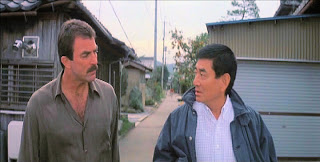 After Hiroko storms out in a staged exit to force Jack and her father to talk, the two do so and after learning Uchiyama is to be fired because of Jack, Jack agrees to do things Uchiyama’s way and begins training hard. His teammates see this effort and join in as well. While Jack makes great progress, he finds that Uchiyama’s dugout mannerism is still terrible and the two have a chat about that with Jack encouraging Uchiyama to allow his players to have fun and allow his pitchers to pitch their way out of trouble. Uchiyama tries this and there is some success, enough so that the Dragons meet their rivals, the Giants, in a game for the pennant. However, this leads to other problems as the gaijin Jack might break Uchiyama’s home run streak and cause company management to lose face, to say nothing of trying to win the game.
After Hiroko storms out in a staged exit to force Jack and her father to talk, the two do so and after learning Uchiyama is to be fired because of Jack, Jack agrees to do things Uchiyama’s way and begins training hard. His teammates see this effort and join in as well. While Jack makes great progress, he finds that Uchiyama’s dugout mannerism is still terrible and the two have a chat about that with Jack encouraging Uchiyama to allow his players to have fun and allow his pitchers to pitch their way out of trouble. Uchiyama tries this and there is some success, enough so that the Dragons meet their rivals, the Giants, in a game for the pennant. However, this leads to other problems as the gaijin Jack might break Uchiyama’s home run streak and cause company management to lose face, to say nothing of trying to win the game.
Thoughts/Review:
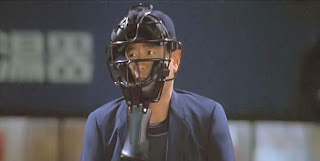 I’m one of these guys who don’t like sports shows, movies, anime, manga, whatever. In addition to Mr. Baseball, I own only two other sports titles — Major League and Field of Dreams. I like sports but I prefer my sports to be real and live (unless it is a repeat of one of my teams kicking some dreaded opponent’s buttocks so I can relive the greatness of the event). I mention this because I wanted this fact clear as you read my thoughts here. I’m guessing a great many anime and manga fans feel the same way (or something very similar) considering how poorly anime and manga sports titles seem to do in sales. Don’t let any negative thoughts you have about sports titles put you off Mr. Baseball.
I’m one of these guys who don’t like sports shows, movies, anime, manga, whatever. In addition to Mr. Baseball, I own only two other sports titles — Major League and Field of Dreams. I like sports but I prefer my sports to be real and live (unless it is a repeat of one of my teams kicking some dreaded opponent’s buttocks so I can relive the greatness of the event). I mention this because I wanted this fact clear as you read my thoughts here. I’m guessing a great many anime and manga fans feel the same way (or something very similar) considering how poorly anime and manga sports titles seem to do in sales. Don’t let any negative thoughts you have about sports titles put you off Mr. Baseball.
Japanese Culture Represented
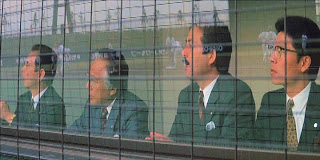 For starters, there’s Jack, who is baptized into Japanese culture by being taken straight from the plane to meet with the corporate executives of the company that owns the Dragons. All of these executives are handing him business cards, a Japanese custom in business, and when he’s told to give them one back, all he has are his collectible baseball cards. He’s then taken to a press conference where he discovers he’s been assigned the number “54” because the Japanese powers that be have carefully computed this and determined that this is the correct number of home runs he should hit that year. I always remember “carefully computed” whenever I hear some nutty business decision coming out of Japan because it’s probably true.
For starters, there’s Jack, who is baptized into Japanese culture by being taken straight from the plane to meet with the corporate executives of the company that owns the Dragons. All of these executives are handing him business cards, a Japanese custom in business, and when he’s told to give them one back, all he has are his collectible baseball cards. He’s then taken to a press conference where he discovers he’s been assigned the number “54” because the Japanese powers that be have carefully computed this and determined that this is the correct number of home runs he should hit that year. I always remember “carefully computed” whenever I hear some nutty business decision coming out of Japan because it’s probably true.
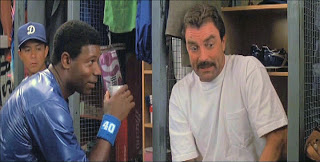 Jack’s next cultural introduction is the Japanese word, “gaijin.” As Max tells him, “Over here, I’m ‘gaijin,’ same as you. It’s like being a black guy back home, only there’s less of us.” This scene always makes me smile because I remember my own education of the word “gaijin” when I arrived in Japan and was taken out on the town by a bunch of guys to places well off the beaten track. There were signs in some places that said, “no blacks,” “no whites,” and “no gaijin.” One of the black guys in our group needled me and said, “now you know what its like to be black.” They all laughed, but at the time, I thought that was a pretty messed up remark. Today, I can smile about it.
Jack’s next cultural introduction is the Japanese word, “gaijin.” As Max tells him, “Over here, I’m ‘gaijin,’ same as you. It’s like being a black guy back home, only there’s less of us.” This scene always makes me smile because I remember my own education of the word “gaijin” when I arrived in Japan and was taken out on the town by a bunch of guys to places well off the beaten track. There were signs in some places that said, “no blacks,” “no whites,” and “no gaijin.” One of the black guys in our group needled me and said, “now you know what its like to be black.” They all laughed, but at the time, I thought that was a pretty messed up remark. Today, I can smile about it.
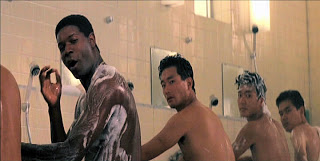 That said, Jack is the quintessential gaijin character from a Japanese perspective and the reason they justify looking down on foreigners. He’s rude, obnoxious, violates Japanese custom at every turn, and for a long time makes no effort to change his ways. Indeed, he finds these customs annoying. He causes quite a stir when he jumps into the large bathtub in the clubhouse without washing first. As one of his Japanese teammates tells him in English, doing that is like jerking off before sex. Jack gets annoyed when the predicted gaijin strike zone is used against him. As the umpire says in English, “You big, you can hit. Come on.” He gets angry when he learns that he must do endorsements as part of his contract because he’s considered property of the team.
That said, Jack is the quintessential gaijin character from a Japanese perspective and the reason they justify looking down on foreigners. He’s rude, obnoxious, violates Japanese custom at every turn, and for a long time makes no effort to change his ways. Indeed, he finds these customs annoying. He causes quite a stir when he jumps into the large bathtub in the clubhouse without washing first. As one of his Japanese teammates tells him in English, doing that is like jerking off before sex. Jack gets annoyed when the predicted gaijin strike zone is used against him. As the umpire says in English, “You big, you can hit. Come on.” He gets angry when he learns that he must do endorsements as part of his contract because he’s considered property of the team.
Japanese Business Practices
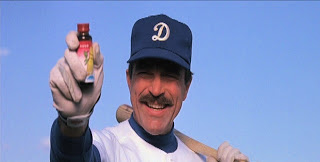 That leads me to the business aspects of the movie. Although the movie might be about an American playing baseball for a Japanese baseball team, Japanese business practices are clearly highlighted in the movie. The way business is done in Japan is not the same as how it is done in America. Jack learns this by seeing how different the game of baseball is played in Japan and how Japanese coaches and players treat it like a job rather than a game. Its disrespectful to take out an opponent in a slide, so those aren’t done. Diving for a ball is considered too much of a risk because you might miss. The same can be said of going for an extra base — getting caught means losing face and that’s worse than taking the safe and sure route.
That leads me to the business aspects of the movie. Although the movie might be about an American playing baseball for a Japanese baseball team, Japanese business practices are clearly highlighted in the movie. The way business is done in Japan is not the same as how it is done in America. Jack learns this by seeing how different the game of baseball is played in Japan and how Japanese coaches and players treat it like a job rather than a game. Its disrespectful to take out an opponent in a slide, so those aren’t done. Diving for a ball is considered too much of a risk because you might miss. The same can be said of going for an extra base — getting caught means losing face and that’s worse than taking the safe and sure route.
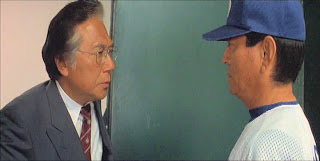 There’s also the corporate micromanagement aspect of Japanese business. Here, Uchiyama-san is the manager of the team and should be calling the shots. However, the corporate executives have their own agenda and anything that would make their company look bad gives them the right to dictate what happens on the field. If Uchiyama-san doesn’t comply, he’s out. When Jack’s actions get out of control and he starts a brawl, the corporate execs are going to punish Uchiyama-san, not Jack. Therefore, one does not do anything that would bring shame upon the company or team or cause a loss of face. Its a lot different from how things are done in America and in the story, it is a lot for Jack to overcome.
There’s also the corporate micromanagement aspect of Japanese business. Here, Uchiyama-san is the manager of the team and should be calling the shots. However, the corporate executives have their own agenda and anything that would make their company look bad gives them the right to dictate what happens on the field. If Uchiyama-san doesn’t comply, he’s out. When Jack’s actions get out of control and he starts a brawl, the corporate execs are going to punish Uchiyama-san, not Jack. Therefore, one does not do anything that would bring shame upon the company or team or cause a loss of face. Its a lot different from how things are done in America and in the story, it is a lot for Jack to overcome.
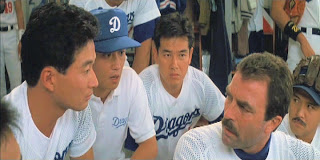 Nevertheless, watching the movie will give anime and manga fans in the U.S. a glimpse of the Japanese mindset when it comes to business. Granted, the movie is nearly 20-years old now and while some things may have changed, many things have not based on my own observations on how the Japanese do things today in anime and manga. Yeah, there are some changes, but they are slow to happen and heavily resisted because these changes, even if required, are risky and could fail. So, even if your company is on a path that is not great, doing the tried and true is the safest bet while hoping things improve on their own because your strategies worked well in the past.
Nevertheless, watching the movie will give anime and manga fans in the U.S. a glimpse of the Japanese mindset when it comes to business. Granted, the movie is nearly 20-years old now and while some things may have changed, many things have not based on my own observations on how the Japanese do things today in anime and manga. Yeah, there are some changes, but they are slow to happen and heavily resisted because these changes, even if required, are risky and could fail. So, even if your company is on a path that is not great, doing the tried and true is the safest bet while hoping things improve on their own because your strategies worked well in the past.
Cultural Clashes
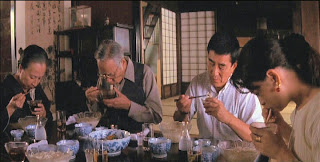 Returning to the movie, I mentioned some of the cultural aspects that Jack has to deal with and that all gaijin have to deal with when they go to Japan. There are those whacky Japanese squat toilets, which I don’t think are as common as they were when this movie was shot (correct me if I’m wrong). There’s the taking off of shoes in homes, schools, and other places. There’s the eating with chopsticks, complete with proper usage and what one should never do. Further to that, there’s the eating aspects and the one scene that always makes me laugh out loud, the slurping of noodles, something considered bad form in the West.
Returning to the movie, I mentioned some of the cultural aspects that Jack has to deal with and that all gaijin have to deal with when they go to Japan. There are those whacky Japanese squat toilets, which I don’t think are as common as they were when this movie was shot (correct me if I’m wrong). There’s the taking off of shoes in homes, schools, and other places. There’s the eating with chopsticks, complete with proper usage and what one should never do. Further to that, there’s the eating aspects and the one scene that always makes me laugh out loud, the slurping of noodles, something considered bad form in the West.
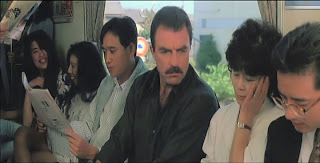 Another moment of culture clash is riding the train and reading manga on the train, or to be more precise, reading hentai manga on the train. *lol* I saw plenty of that, but I also was amazed at how “normal comics” also contained nudity in them. Even more amazing to me was how mid-day “cartoons” could have nudity in them (Ranma 1/2 springs to mind). A lot of that has changed today as shounen manga and anime tend to avoid detailed nudity, leaving that for seinen manga titles (and maybe josei manga titles, though my experience with them is too limited to know for sure). Regardless, Jack’s amazement that a Japanese man could be reading a hentai manga right next to a married woman always makes me chuckle.
Another moment of culture clash is riding the train and reading manga on the train, or to be more precise, reading hentai manga on the train. *lol* I saw plenty of that, but I also was amazed at how “normal comics” also contained nudity in them. Even more amazing to me was how mid-day “cartoons” could have nudity in them (Ranma 1/2 springs to mind). A lot of that has changed today as shounen manga and anime tend to avoid detailed nudity, leaving that for seinen manga titles (and maybe josei manga titles, though my experience with them is too limited to know for sure). Regardless, Jack’s amazement that a Japanese man could be reading a hentai manga right next to a married woman always makes me chuckle.
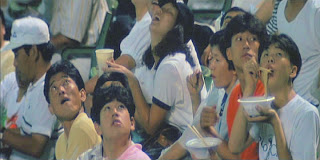 A moment that makes me smile are the way Japanese baseball games are done (the trumpets, clapping, eating — all as I remember it). I never did make it to a Japanese baseball game, but saw a number of games on TV thanks to Japanese co-workers. Indeed, I think many of the crowd shots and the like were taken from actual Japanese baseball games. I really wasn’t into baseball back then so I passed on a chance to see any of the teams (to say nothing of the expense, which for someone making less than $10K/year back then, going to a ballgame would have meant a major expense for the month).
A moment that makes me smile are the way Japanese baseball games are done (the trumpets, clapping, eating — all as I remember it). I never did make it to a Japanese baseball game, but saw a number of games on TV thanks to Japanese co-workers. Indeed, I think many of the crowd shots and the like were taken from actual Japanese baseball games. I really wasn’t into baseball back then so I passed on a chance to see any of the teams (to say nothing of the expense, which for someone making less than $10K/year back then, going to a ballgame would have meant a major expense for the month).
Japanese Honorific Usage
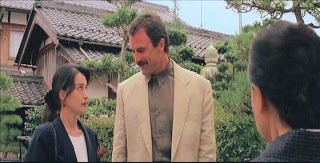 As you might expect, honorifics are used in this movie. However, unlike anime, manga, or Japanese novel works where honorifics become story elements, the only honorific I recall hearing in Mr. Baseball is “-san.” As such, the movie gives an accurate representation of how honorifics are commonly used by adults in Japanese society rather than the exaggerated usage found in anime and manga for as literary devices. Thankfully, even when characters are speaking in English, terms like “Jack-san” or “Uchiyama-san” are retained because that’s how it would be done in Japan. The honorifics wouldn’t be stripped out just because people might become confused and run away in terror. ^_~
As you might expect, honorifics are used in this movie. However, unlike anime, manga, or Japanese novel works where honorifics become story elements, the only honorific I recall hearing in Mr. Baseball is “-san.” As such, the movie gives an accurate representation of how honorifics are commonly used by adults in Japanese society rather than the exaggerated usage found in anime and manga for as literary devices. Thankfully, even when characters are speaking in English, terms like “Jack-san” or “Uchiyama-san” are retained because that’s how it would be done in Japan. The honorifics wouldn’t be stripped out just because people might become confused and run away in terror. ^_~
Final Thoughts
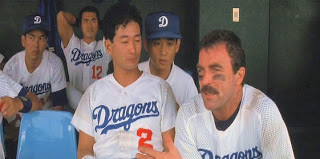 As to the overall story itself, I do like it a lot. I admit I am biased since the movie was shot in Japan when I lived there. As such, watching the movie is like stepping back in time for me when I lived in Japan and recalling my own culture shocks. It also reminds me that a part of me will always be in Japan. Even if these elements weren’t a part of the equation, the movie is still pretty enjoyable with its look at an American who’s forced to live in Japan (and the humor that often comes with that), Jack’s romance with Hiroko (and the problems associated with a gaijin romance), and naturally the way Jack pulls it together and be accepted by his Japanese teammates.
As to the overall story itself, I do like it a lot. I admit I am biased since the movie was shot in Japan when I lived there. As such, watching the movie is like stepping back in time for me when I lived in Japan and recalling my own culture shocks. It also reminds me that a part of me will always be in Japan. Even if these elements weren’t a part of the equation, the movie is still pretty enjoyable with its look at an American who’s forced to live in Japan (and the humor that often comes with that), Jack’s romance with Hiroko (and the problems associated with a gaijin romance), and naturally the way Jack pulls it together and be accepted by his Japanese teammates.
Hopefully, I’ve encouraged some of you to take a look-see. I don’t think you’ll be disappointed.



 June 17th, 2011
June 17th, 2011  AstroNerdBoy
AstroNerdBoy  Posted in
Posted in  Tags:
Tags: 
I love this movie. Its just so funny at times. Glad you decided to review it.
Color me encouraged =D
I’ve never seen it, but I’m not intrigued.
As for the squat toilets, from what I have read online they are more prevalent globally than sit down toilets are. In fact, squatting to go to the bathroom is better for you and is the reason why countries which use sit down toilets tend to get hemorrhoids and other related maladies so much less often than other cultures.
I love this movie. Its just so funny at times. Glad you decided to review it.
I meant to do it a long time ago but things kept getting in the way. ^_^;;;
Color me encouraged =D
^_^
I’ve never seen it, but I’m not intrigued.
But, its so good. ^_~
As for the squat toilets, from what I have read online they are more prevalent globally than sit down toilets are.
That may be, but in Japan, I know more and more western toilets are being used. Plus, modern Japanese toilets are pretty awesome in what they can do. ^_~
Back when I first saw this movie as a kid, my only knowledge of Japanese culture was limited to what was available at that time, probably things like Teenage Mutant Ninja Turtles and the Karate Kid I&II.
It might be interesting to see this movie again; not only from an adult perspective who’s studied Japanese and is more aware of the nuances of the culture, but also as a time machine to Japan of the late 80’s/early 90’s.
Typo in my first post, I meant to say I am NOW intrigued lol
I don’t know if you noticed, but there were two guys reading hentai on the train. If you notice in the screen grab you have posted, the man standing roughly in front of Tom Selleck’s character is also reading one.
It might be interesting to see this movie again; not only from an adult perspective who’s studied Japanese and is more aware of the nuances of the culture, but also as a time machine to Japan of the late 80’s/early 90’s.
If you do, I’d be interested to hear your thoughts. ^_^
Typo in my first post, I meant to say I am NOW intrigued lol
*lol* Well, cool. ^_^ If you do watch it, you’ll have to let me know what you thought, good or bad.
I don’t know if you noticed, but there were two guys reading hentai on the train. If you notice in the screen grab you have posted, the man standing roughly in front of Tom Selleck’s character is also reading one.
Whoa! You’re right. The focus was on the guy to Tom’s left so I never really paid attention to the other guy. Cool. Thanks for letting me know. ^_^
[…] By the way, I highly recommend watching Mr. Baseball (Buy.com)(Barnes & Nobel) if you want a glimpse into Japanese business practices (my review is here). […]